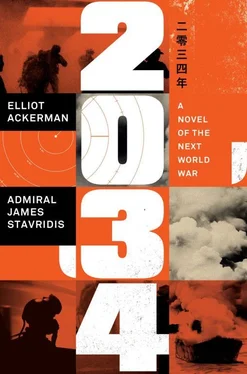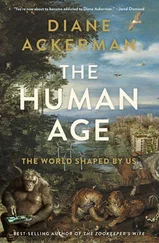Out on his walk, Farshad arrived at the stream on his property. He stepped onto the footbridge, leaned against its balustrade, and gazed into the clear glacial melt that passed below. His thoughts turned from the last year to the last few days, to his trip to Bandar Abbas and the final, albeit somewhat absurd, honor that the Navy had bestowed on him: the dedication of a vessel in his name.
Admittedly, Farshad had been quite flattered at first. Although he was technically retired as an officer in the Revolutionary Guards, the Navy had taken him in when his career was in tatters, and now, bedecked with his newfound glory, they proved keen to claim Farshad as their own. He pictured the sleek prow of a frigate or cruiser with his name emblazoned on its side. He could envision the teeth of its magnificent anchor, and its decks bristling with rockets, missiles, guns, and a crew that kept the ship, and thus his name, gleaming as it crossed horizon after horizon.
Several weeks passed while arrangements were made for Farshad’s travel to Bandar Abbas. Then the Navy forwarded along the specifications of the vessel that would bear his name.
Not a frigate.
Not a cruiser.
Not even a puny yet swift corvette.
A photograph of the undedicated vessel accompanied the announcement; the shape of its hull was like a wooden shoe, wide in the front, narrow in the back, functional but not something anyone would wish to be seen in. The decision had been made to dedicate a newly laid Delvar-class logistics ship in his honor.
Standing on the footbridge over the stream, Farshad leaned forward and considered his reflection as he thought of the many photographs that had been taken of him over these past few days. When he’d arrived in Bandar Abbas, the Navy had scheduled an ambitious itinerary. After dedicating the ship, he accompanied it out to sea for its maiden voyage, which took them to the now heavily garrisoned islands in the Strait of Hormuz where he’d fought his famous battle. As a surprise—and a signal that Iran would lead the nations of the world in the process of reconciliation—there was a guest visitor aboard: Commander Vasily Kolchak. Kolchak, it turned out, had been part of the Russian invasion fleet a year before.
The two were scheduled to sail through the Strait of Hormuz together—allies turned adversaries, then allies again. He was pleased to see Kolchak, who had also been promoted since their last encounter. The dedication ceremony was on the whole a pleasant affair, except when the seas rose late that afternoon. The pitch and roll of the little, flat-hulled logistics ship that bore Farshad’s name soon proved too much for him. He spent the final hours of the maiden voyage locked in the latrine, retching, while his old friend Kolchak stood vigil outside the door, doing Farshad one last favor. He made certain nobody witnessed the greatest naval hero in a generation bent over on all fours debilitated by seasickness.
As Farshad rested on the footbridge, recalling these past few days, he felt reassured to know that in all likelihood he would never again see a body of water larger than the little stream that babbled pleasantly below his feet. He continued on his walk. The leaf-filtered sun fell along the path and on Farshad’s upturned and smiling face. It felt good to have the steady earth beneath him. He breathed deeply and quickened his pace. Soon he was at the far end of his property, near the elm where he was in the habit of taking his lunch.
He sat with his back against the trunk. On his lap, he spread out his meal: the egg, the bread, the olives. Since his bout of seasickness, his appetite hadn’t quite returned. He only nibbled at his food. He thought of Kolchak. When the two had a quiet moment on the ship that bore Farshad’s name, the Russian had asked him what he would do now that he was retired. Farshad didn’t mention his memoirs—that would’ve been too presumptuous. Instead, he talked about this land, his walks, a quiet life in the countryside. Kolchak had laughed uproariously. When Farshad asked what was so funny, Kolchak said that he never took Farshad as one for the quiet life. He had expected Farshad to try his hand at politics, or business; to use his notoriety to vault toward the topmost rungs of power.
Farshad finished his lunch. He wondered what his old mentor Soleimani would think of his decision to strive for a quieter life. It was, after all, Soleimani who had wished a soldier’s death for his young protégé, as opposed to the withering away he himself had feared and so narrowly avoided. How many times and on how many battlefields had Farshad cheated death? Too many to count. But as he thought of this, he began to wonder whether he’d cheated death or if it was death who had cheated him, never granting the end that Soleimani had wished for Farshad. Still, sitting beneath the elm at the edge of his property, Farshad couldn’t quite bring himself to wish that he’d died on a battlefield. Didn’t a soldier deserve the fruits of his labor? It seemed fitting that at the end of his days a soldier would become an intimate with peace. One might argue that the highest achievement for a soldier wasn’t to die on the battlefield, but rather to pass away quietly in a peace of his own creation.
A few morsels of his meal remained. Farshad flattened the paper sack in front of him on the grass, placing a piece of egg, a crust of bread, and two olives in a neat arrangement.
He waited. Waiting as he’d done nearly every day since his return home the year before. He dozed off. When he awoke, the afternoon sun held just above the treetops. The shadows had lengthened. Now he saw what he’d been watching for. Standing in the open grass was the single squirrel, the white-tailed one whose partner had bit Farshad long ago.
He placed the crust in his hand, offering it to her.
She wouldn’t come. Yet she wouldn’t run away either.
On many an afternoon, the two of them had sat fixed in a similar impasse. It always ended when Farshad walked off and the squirrel safely ate what he left behind on the paper sack. But Farshad wouldn’t quit. Eventually, he would convince her to trust him enough to eat again from his open palm. What would Kolchak, Bagheri, Soleimani, or even his father think if they could see him now, reduced to this, an old man coaxing this helpless creature toward him.
But Farshad no longer cared.
“I’m not giving up,” he whispered to the squirrel. “Come closer, my friend. Don’t you believe even an old man can change?”

07:25 October 03, 2036 (GMT-4)
Newport
New home. New city. The loss of her father. The overworked guidance counselor at their local middle school had told the girl’s mother that the first year would be the hardest. Yet the second year was proving harder still. When they’d left their home in Beijing for the countryside, her mother had said it would only be for a few days. The girl had repeatedly asked to speak to her father on the phone, and her mother had tried to call but couldn’t reach him. According to her mother, he had been doing important work for their government. She was old enough to understand that there had been a war on, that this was the reason they’d had to leave the capital. However, she wasn’t quite old enough to understand her father’s role. That understanding would come later, after Shanghai, when she and her mother were recalled to Beijing.
She remembered the old man who’d come to their apartment. Several of his large attendants in dark suits had waited outside the door. The old man carried himself like a well-dressed peasant. When her mother told her to go to her room so they could speak, the old man insisted that the girl stay. He cupped her cheek in his hand and said, “You look very much like your father. I see his intelligence in your eyes.” The old man went on to tell them that their home wasn’t their home anymore. That her father—intelligent as he was—had had bad luck, he’d made some mistakes, and he wouldn’t be returning. Her mother would cry later, at night, when she thought her daughter couldn’t hear her. But she didn’t betray a single emotion in front of the old man, who suggested they go live in the United States. “This will help things,” he said. And then he asked if there was anywhere in particular that they would like to go.
Читать дальше













